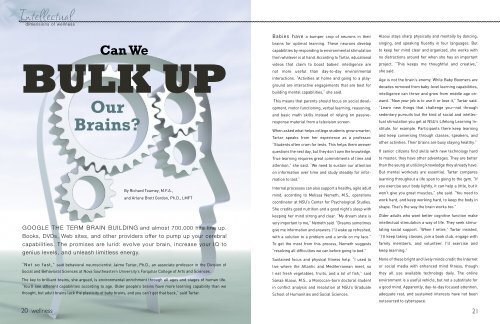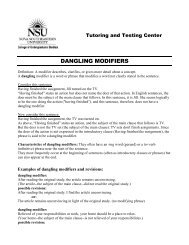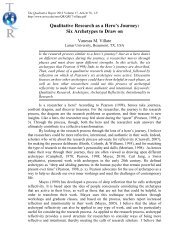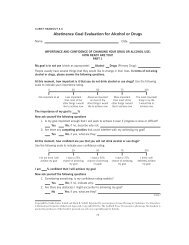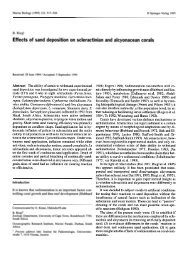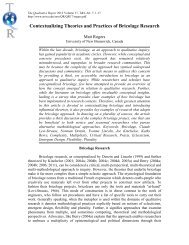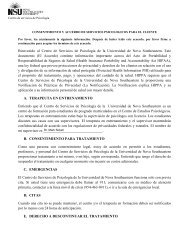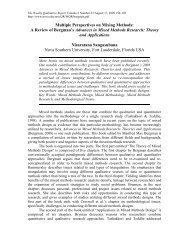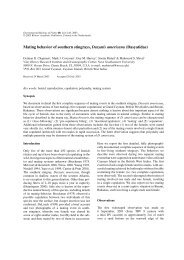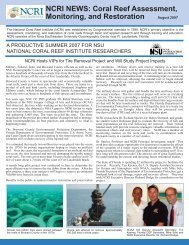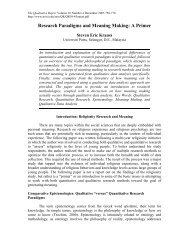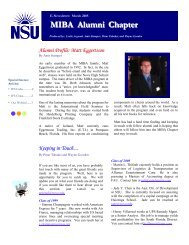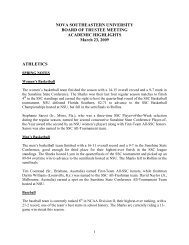Can We Bulk up - Nova Southeastern University
Can We Bulk up - Nova Southeastern University
Can We Bulk up - Nova Southeastern University
Create successful ePaper yourself
Turn your PDF publications into a flip-book with our unique Google optimized e-Paper software.
Intellectual<br />
dimensions of wellness<br />
20<br />
wellness<br />
made simple<br />
<strong>Can</strong> <strong>We</strong><br />
<strong>Bulk</strong> <strong>up</strong><br />
Our<br />
Brains?<br />
By Richard Toumey, M.F.A.,<br />
and Arlene Brett Gordon, Ph.D., LMFT<br />
GOOGlE ThE TErm brAIN bUIldING and almost 700,000 hits line <strong>up</strong>.<br />
books, dVds, <strong>We</strong>b sites, and other providers offer to pump <strong>up</strong> your cerebral<br />
capabilities. The promises are lurid: evolve your brain, increase your IQ to<br />
genius levels, and unleash limitless energy.<br />
“Not so fast,” said behavioral neuroscientist Jaime Tartar, Ph.D., an associate professor in the Division of<br />
Social and Behavioral Sciences at <strong>Nova</strong> <strong>Southeastern</strong> <strong>University</strong>’s Farquhar College of Arts and Sciences.<br />
The key to brilliant brains, she argued, is environmental enrichment through all ages and stages of human life.<br />
“You’ll see different capabilities according to age. Older people’s brains have more learning capability than we<br />
thought, but adult brains lack the plasticity of baby brains, and you can’t get that back,” said Tartar.<br />
Babies have a bumper crop of neurons in their<br />
brains for optimal learning. These neurons develop<br />
capabilities by responding to environmental stimulation<br />
from whatever is at hand. According to Tartar, educational<br />
videos that claim to boost babies’ intelligence are<br />
not more useful than day-to-day environmental<br />
interactions. “Activities at home and going to a playground<br />
are interactive engagements that are best for<br />
building mental capabilities,” she said.<br />
This means that parents should focus on social development,<br />
motor functioning, verbal learning, reasoning,<br />
and basic math skills instead of relying on passiveresponse<br />
material from a television screen.<br />
When asked what helps college students grow smarter,<br />
Tartar speaks from her experience as a professor.<br />
“Students often cram for tests. This helps them answer<br />
questions the next day, but they don’t own the knowledge.<br />
True learning requires great commitments of time and<br />
attention,” she said. “<strong>We</strong> need to sustain our attention<br />
on information over time and study steadily for information<br />
to last.”<br />
Internal processes can also s<strong>up</strong>port a healthy, agile adult<br />
mind, according to Melissa Nemeth, M.S., operations<br />
coordinator at NSU’s Center for Psychological Studies.<br />
She credits good nutrition and a good night’s sleep with<br />
keeping her mind strong and clear. “My dream state is<br />
very important to me,” Nemeth said. “Dreams sometimes<br />
give me information and answers. I’ll wake <strong>up</strong> refreshed,<br />
with a solution to a problem and a smile on my face.”<br />
To get the most from this process, Nemeth suggests<br />
“resolving all difficulties we can before going to bed.”<br />
Sustained focus and physical fitness help. “I used to<br />
live where the Atlantic and Mediterranean meet, so<br />
I eat fresh vegetables, fruits, and a lot of fish,” said<br />
Sanaa Alaoui, M.S., a Moroccan-born doctoral student<br />
in conflict analysis and resolution at NSU’s Graduate<br />
School of Humanities and Social Sciences.<br />
Alaoui stays sharp physically and mentally by dancing,<br />
singing, and speaking fluently in four languages. But<br />
to keep her mind clear and organized, she works with<br />
no distractions around her when she has an important<br />
project. “This keeps me thoughtful and creative,”<br />
she said.<br />
Age is not the brain’s enemy. While Baby Boomers are<br />
decades removed from baby-level learning capabilities,<br />
intelligence can thrive and grow from middle age onward.<br />
“Now your job is to use it or lose it,” Tartar said.<br />
“Learn new things that challenge you—not through<br />
sedentary pursuits but the kind of social and intellectual<br />
stimulation you get at NSU’s Lifelong Learning Institute,<br />
for example. Participants there keep learning<br />
and keep conversing through classes, speakers, and<br />
other activities. Their brains are busy staying healthy.”<br />
If senior citizens find skills with new technology hard<br />
to master, they have other advantages. They are better<br />
than the young at utilizing knowledge they already have.<br />
But mental workouts are essential. Tartar compares<br />
learning throughout a life span to going to the gym. “If<br />
you exercise your body lightly, it can help a little, but it<br />
won’t give you great muscles,” she said. “You need to<br />
work hard, and keep working hard, to keep the body in<br />
shape. That’s the way the brain works too.”<br />
Older adults who want better cognitive function make<br />
intellectual stimulation a way of life. They seek stimulating<br />
social s<strong>up</strong>port. “When I retire,” Tartar insisted,<br />
“I’ll keep taking classes, join a book club, engage with<br />
family members, and volunteer. I’ll exercise and<br />
keep learning.”<br />
None of these bright and lively minds credit the Internet<br />
or social media with enhanced mind fitness, though<br />
they all use available technology daily. The online<br />
environment is a useful vehicle, but not a substitute for<br />
a good mind. Apparently, day-to-day focused attention,<br />
adequate rest, and sustained interests have not been<br />
outsourced to cyberspace.<br />
21


